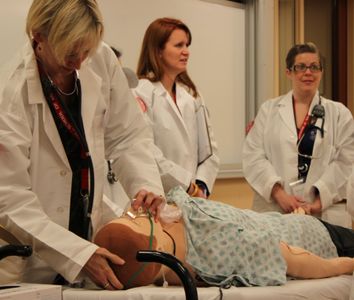Project Medical Education: BUSM and BMC Host Program for Legislators and Policymakers
Boston University School of Medicine (BUSM) and Boston Medical Center (BMC) hosted legislative aides and medical education staffers participating in an Association of American Medical Colleges (AAMC) initiative where they received a compressed “medical education” followed by “residency”. The goal of the program is to inform policymakers on issues affecting the future of medical education. Sponsored in Boston by the Council of Boston Teaching Hospitals (COBTH), the medical education day included the three Boston medical schools and 12 local hospitals.
Members of several congressional offices from Massachusetts and Maine, academic medical centers and the AAMC assumed the roles of medical student and resident. They started the day with a “White Coat Ceremony,” receiving the symbol of acceptance into the medical profession from Sharon Levine, MD, associate dean for academic affairs and Phyllis Carr, MD, associate dean for student affairs.
BUSM Leadership provided an overview of each of the four years of medical school and discussed the complexity of integrating basic science teaching with clinical experience and the substantial cost of doing so. The importance of the research enterprise was stressed both as a resource and a tool for educating physicians as well as the value to society. “For every dollar spent on research, eight dollars is generated,” said Dean Antman. “Physicians practicing medicine also generate millions of dollars in their communities.”
The “medical students” attended an anatomy class which included a cadaver dissection and had the opportunity to “treat” a patient using a Patient Simulator. They concluded their “medical education” with a Match Day letter and an accounting of their educational debt, noted at the average of $160,000.
To start their postgraduate training, they were greeted by Kate Walsh, president and CEO of BMC, in the emergency department. Walsh shared the mission of the hospital which cares for the underserved in Boston and regionally. “Seventy-five percent of our patients are eligible for publicly funded health insurance,” said Walsh. “We recognize that a medical issue may be only a small part of what our patients need to be healthy. They may have nowhere to live and are not sure where the next meal is coming from. “
Participants were paired up with residents and “assigned” patients, following them from the emergency department to inpatient family medicine. A graduation ceremony was conducted in the evening at Beth Israel Deaconess Medical Center, after the participants also visited the Boston VA and Carney Hospital.
“Medical education is the foundation and future of our nation’s health-care system,” said Walsh. “It is a complex, collaborative process that requires substantial resources, both intellectual and financial.”
View all posts